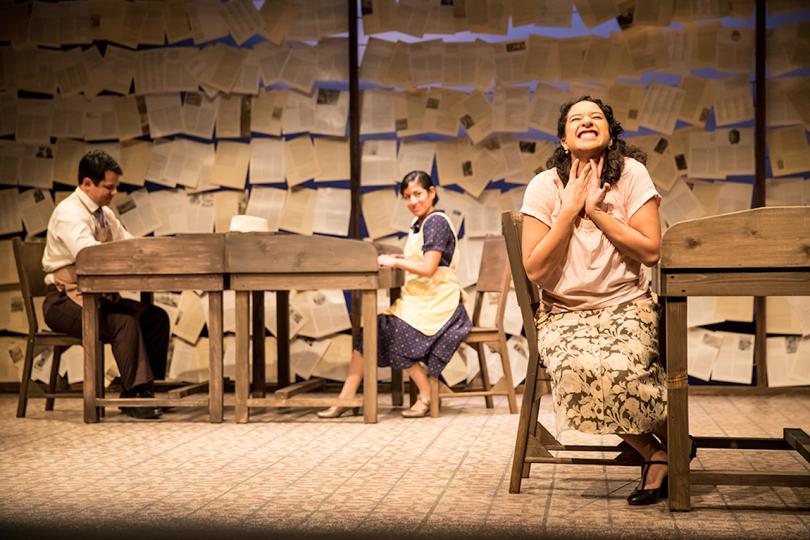No longer innocent

I first saw Anna in the Tropics when I was way too young for it. The romanticism countered with heavy themes like sexual assault, not to mention the love scene at the top of act two, went way over my head. I left the play feeling like I had stumbled on a new world that I would someday understand. When I saw that the Jungle Theater was starting its 2017 season with it, I jumped at the chance to see, understand and be awed by it.
Nilo Cruz’s 2003 Pulitzer Prize-winning play follows a family of Cuban immigrants living in 1929 Florida. When they welcome a new lector to their cigar factory to read aloud to the workers, he brings in Tolstoy’s Anna Karenina. As he delivers the lusty tale, the family changes forever. The show starts off a new season about “unforgettable, intergenerational characters confronting moments of great change with heart and humor,” Jungle artistic director Sarah Rasmussen wrote. With the country’s shifting relations with Cuba and unpredictable policy changes for immigrants, staging this play now makes complete sense.
Los Angeles-based director Larissa Kokernot brought out the play’s ode to storytelling. There are lines about how Anna’s story transports the workers to places far beyond their situation. Later, when the eldest married sister is deep into an affair with the lector, we have words about actors who stop playing themselves and enter the lives of others. Scenic designer Andrea Heilman captured this in an impressive set. The factory walls were magazine pages that flipped up and down like blinds to let Barry Browning’s lighting surround the space. Sarah Bahr brought it all home with lush costumes. The production elements really did their job in bringing us south, where the characters are trying to recreate the island of their homeland, and where Anna Karenina transports them to snowy Moscow.
Too evenly spread
The storytelling through-line was the strongest in a perfectly acceptable production that still managed to float above the head rather than into it, or goodness forbid, the heart. Though the play’s setting is relevant to today, little of the action went to strengthening that connection. The first act wound through volumes of sultry dialogue and slow character development that didn’t reveal much about the characters at all. By the time the stage went dark for intermission after the lector and sister’s lips first touched, it was unclear what was really at stake.
In the second act, everything made more sense. The factory owners squabble about the threat of machines replacing workers in an age of evolving industry. The older sister and her husband go head-to-head about her affair while the younger one is pursued and then assaulted by her uncle, a factory manager. Though vestiges of this action exist in the first act, I was left wondering why so much was left for the second act only.
As a whole, the play hinted at a handful of themes, including the sexual and storytelling ones. But much like they had when I was a kid, the ideas floated around with vague weight, leaving the overall point mysterious. Then, I chalked my misunderstanding up to being 11, but now, I’m not sure.
Competent casting
The small cast was capable, but the actors seemed to start the show in different worlds. As energetic younger sister Marela, Cristina Florencia Castro was way more wound up than her scene mates in act one, but mellowed to great nuance in act two. As elder sister Conchita, Nora Montañez was quiet and reserved. Their energies were, of course, supposed to be different, but it seemed like they belonged to different productions — one exaggerated, one painfully realistic. Adlyn Carreras saved everybody with her grace as mother and factory owner Ofelia. She was sharp and alluring and added a needed levity to even the darkest scenes. As lector Juan Julian, Juan Rivera Lebron was understated to a point where the character’s sensual pull also went overhead. Thankfully, everyone somehow fit together in the climactic final scenes.
When the factory when dark, I felt gently moved and a lot like I had as a child after watching the same scenes. A lot had happened on that stage, and I had surely been transported somewhere else, just like the characters had by Anna. But I was unable to understand where I had been taken, or why. It’s a poetic piece that I think could be unparalleled if given the right production, and the Jungle team was certainly talented. Somehow, though, the pieces did not seem to connect.
Maybe I’ll give this show a try another time and see if I have grown up enough to love it.


